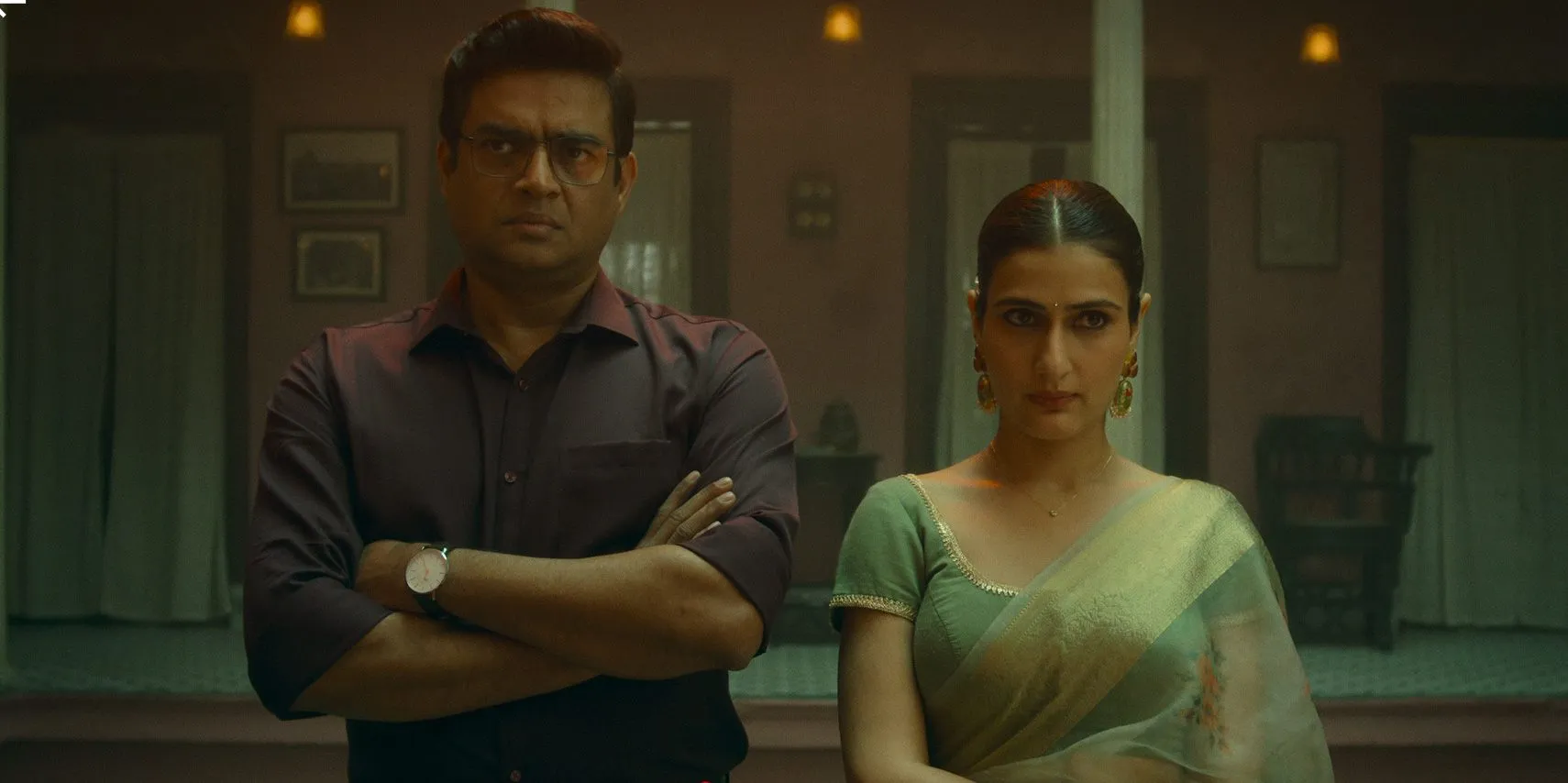Trigger Warning: This is a review of the film ‘Afwaah’ and mentions violence.
Afwaah is an enthralling story of how dogmatist socio-political setups incite prejudiced patterns and drive people towards violent lynching incidents in the clad of scornful propaganda like “Love Jihad” and cow vigilance.
A story weaved around the relevant themes of Love Jihad, mob lynching and communal violence gets triggered through moulded realities in contrast with preeminent human values, rebellion and courage to take a stand against the hate hurricane.
Weaving the story around the themes of Love Jihad, cow vigilance, communal violence and the mob-lynching incidents in Sawalpur of Rajasthan, the medium-paced screen-turner Afwaah unbolts several stratums of embedded religious and gender misogynies. In the hands of blood-thirsty politicians, religion is just a tool to manipulate the public in order to mould a narrative for elections. With the same token, faith is also used as an instrument to govern women.
Weaving the story around the themes of Love Jihad, cow vigilance, communal violence and the mob-lynching incidents in Sawalpur of Rajasthan, the medium-paced screen-turner Afwaah unbolts several stratums of embedded religious and gender misogynies. In the hands of blood-thirsty politicians, religion is just a tool to manipulate the public in order to mould a narrative for elections. With the same token, faith is also used as an instrument to govern women.
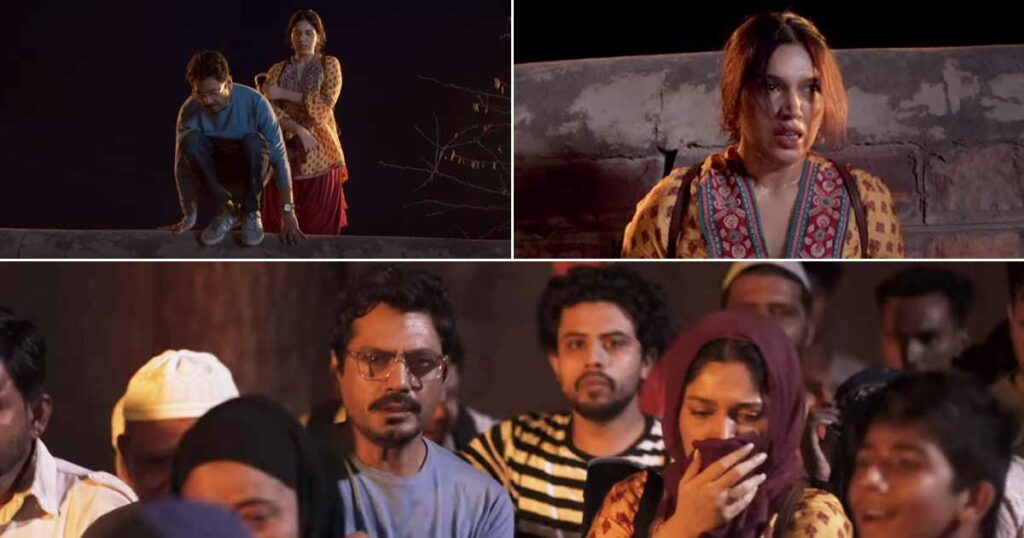
The political thriller by Sudhir Mishra, Afwaah, sheds light on the dark role of IT cell generated fake news, rumours and vicious agenda in communal hate explosion. In the opening scene, the gentle aura of the US returned entrepreneur Rahab Ahmad (Nawazuddin Siddiqui) grabs the eyeballs with funny-witty public speech. At the same time, in further segments, the stubborn, strong, dusky & beautiful Nivi (Bhumi Pednekar) overpowers the male characters. Sumeet Vyas has also effectively rendered the character of a power-hungry emerging leader Vikram Singh alias ‘Vicky’ who gets engaged to Nivi, the daughter of an influential political persona. The screenplay by Sudhir Mishra, Nisarg Mehta and Shiva Bajpai is able to exemplify the entangled threads of fast-growing religious hate and the bygone rusted urge to decide the future of women underneath the religious roof.
In the subsequent set-up, Vicky is seen stimulating the masses through the sensational use of language. A power propel show endorsed by goons, agitating flashy slogans flips the situation, leading to incidences of communal-riot eruption. Consequently, Nivi chooses to drop the decision of sharing life with Vicky. Nivi, 23, who came home to overcome a heart-wrenching break-up raises questions on the sagacity of getting engaged to a hate-monger just because she was sad at a marriage-worthy age. In search of finding an escape, she elopes from the home, further getting rushed and encircled by Vicky’s goons who want to take their Bhabhi sa back to her fiancé.
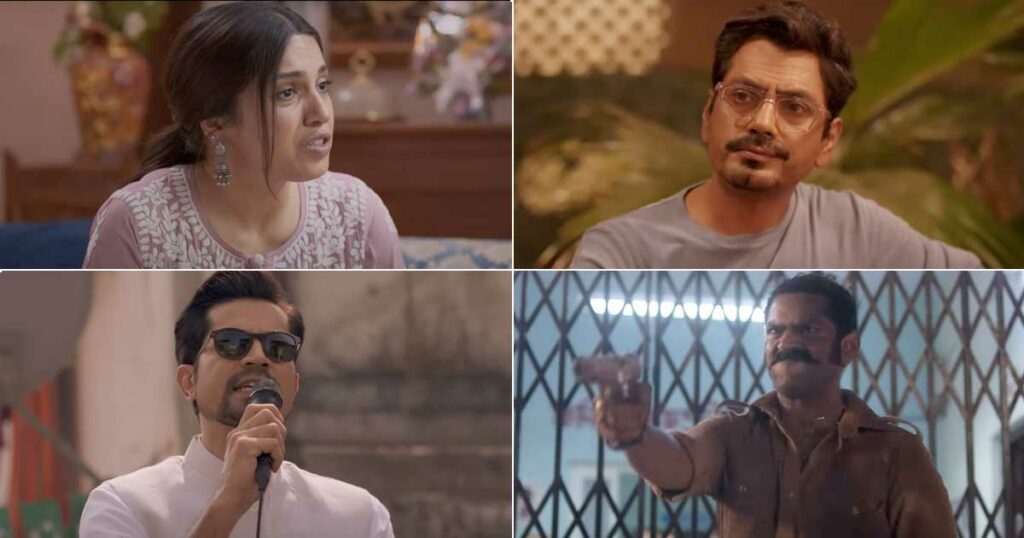
The elopement incident owns a two-fangled significance. Unleashing the patriarchal pressures to get married in the early phase with a man who perfectly matches the status quo as per family requirements in upper-class society, the film also unlocks the brave and progressive attitude of Nivi who is dodged to break these bigotry shackles. She steps out all alone, on her feet, with a pink dupatta tied on the back through a bag resembling freedom from a shackle.
Precisely, Anubhav Sinha produced Afwaah is an important film to clarify the visionary lenses amid the throng of brazenly mushrooming propaganda movies which baffle and misguide the public through false data and staging.
Rahab helps Nivi when she fights aggressively with Vicky’s goons on the street and none dares to protect her from the forceful attempts to take her back. She takes shelter in his vehicle to get away, gets recorded and then on the command of Vicky, a fake video spreads across Sawalpur projecting Rahab Ahmad as a lover of an already engaged Hindu woman, Nivi, inflaming a “Love Jihad” angle.
The further comments, stares, reactions and treatment to this situation open up the coatings of deep-rooted communal as well as gender discrimination. Throughout the film, they run against the cask of the gun. Nivi’s outrageous bold response to a college student emphasises the treacherous outcomes of a flaring rumour when she says- “Ek bewkoof dusre bewkoof ko aake ek baat btata hai aur afwaah paida ho jati hai”(One fool tells something to another fool and a rumour emerges).
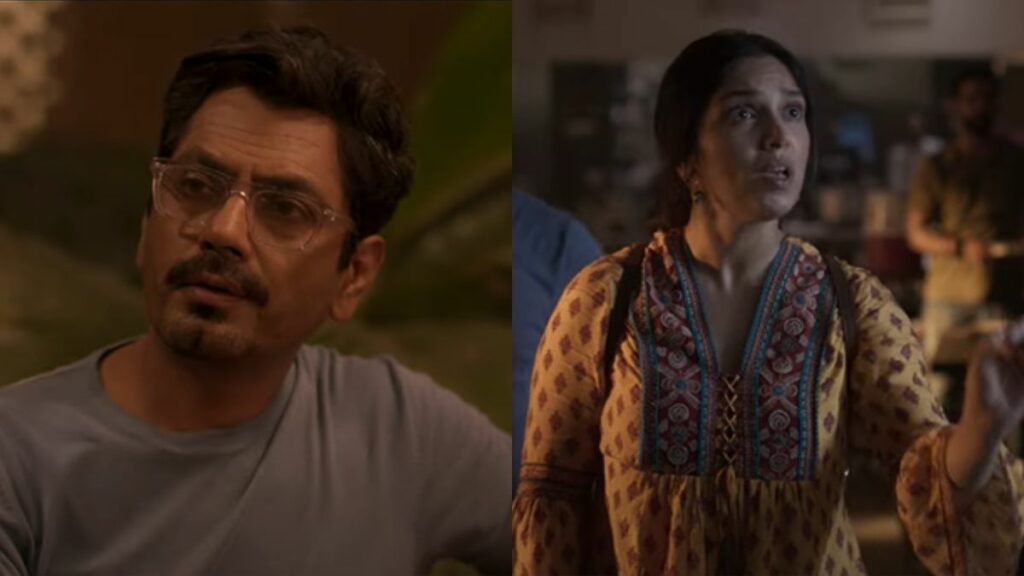
In between the pauses from harsh outbreaks, Rahab and Nivi form a beautiful bond by sharing their secrets and wounds. A connection of humanity & friendship leaves fragrant marks on the screen, very different from the blood marks and none can categorise this under the socially-accepted rigid-stiff frames. Rahab tells Nivi how he has been lying about raising his voice to save the life of a grandson-grandfather pair from racist attackers in America.
In the next quick clash with a goon, Nivi’s arm gets wounded by a bullet. The remark of hoodlum Chandan (Sharib Hashmi) that Vicky owns the right to punish her shells out the stinking notion of judging and controlling women like property. Nivi’s reaction “Padharo mahare desh” (Welcome to our country) also signifies the same.
In the counterpart theme, Vicky’s thirst to gun down Chandan, a right-wing goon who gets caught and recorded red-handed in a meat shop while communal hate arson, sheds light on the dark side of the socio-political dissertation. Another fake news inventing a beef related rumour targeting Chandan’s truck and the brutal death of Vicky in a mob-lynching incident stresses the fact that even hate-mongers can become a victim of their own lethal organised criminal conspiracy.
The relationship of the local SP Tomar (Sumit Kaul) with his subordinate female colleague Riya (TJ Bhanu) paints the chauvinist aptitudes at workspaces. Seeing a mother compelling her own daughter to sleep over with a married man to get professional betterment and support her marginalised family shows up how women from feeble backgrounds in the social arena can become easy prey to the atrocious patriarchal clutch.
The relationship of the local SP Tomar (Sumit Kaul) with his subordinate female colleague Riya (TJ Bhanu) paints the chauvinist aptitudes at workspaces. Seeing a mother compelling her own daughter to sleep over with a married man to get professional betterment and support her marginalised family shows up how women from feeble backgrounds in the social arena can become easy prey to the atrocious patriarchal clutch. In the end, Riya somehow gathers enough courage to revolt and speak for herself “Aaj se na mahere upar ladne ki permission hai na hath rakhne ki” (From today you are not allowed to have sex with me or put your hands on me).
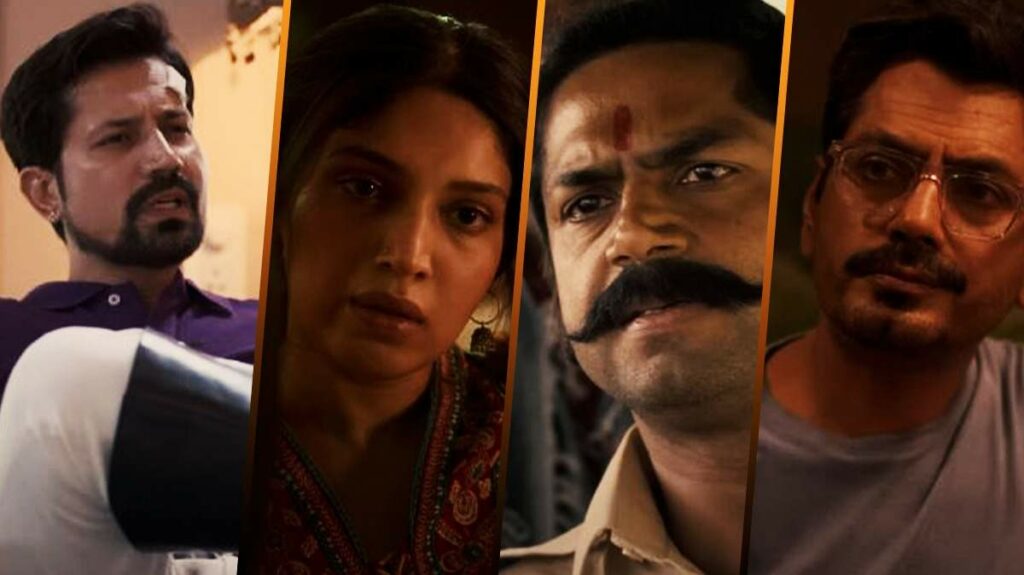
Later, Nivi joined the political legacy of the family and Rahab happily waved a hand to her pointing out the mounting journey of time and change. In comparison, Rahab’s wife Nandita (Eisha Chopra) is another character who buckles up the cinematic magic. She is a writer with enough courage to cherry-pick an inter-faith marriage and stand alone against the crowd with the firm willpower to support her husband.
The only song ‘Aaj ye basant’ in the weighty deep voice of Sunetra Banerjee with violent scenes popping on the screen intensifies the shocking piercing smoky distress of the prejudiced confusions and boiling rage.
The ongoing embedded process of instigating the public in the name of religion makes the movie pertinent, noteworthy and appealing. From cow-vigilante ruffians expanding across India to sizzling controversy on forming a law to control interfaith marriages, the movie captivates the torrid nerves of the contemporary political cocoon.
Precisely, Anubhav Sinha produced Afwaah is an important film to clarify the visionary lenses amid the throng of brazenly mushrooming propaganda movies which baffle and misguide the public through false data and staging. The ongoing embedded process of instigating the public in the name of religion makes the movie pertinent, noteworthy and appealing. From cow-vigilante ruffians expanding across India to sizzling controversy on forming a law to control interfaith marriages, the movie captivates the torrid nerves of the contemporary political cocoon.
The Bollywood thriller, Afwaah, with a budget of 40 crores, released on 5th May has somehow collected 3.40 crores in early 7 days. However, after the clogged dark story the movie ends on a happy note but a wish keeps pulsating with a question. What if a Muslim man really falls in love with a Hindu woman in the blistering hate-violence scenario as shown in the movie? The curtain drops here but the wish to see that iron-gate wide open keeps throbbing inside my heart as Rahab has knocked on a locked door at the literature festival. Probably, someone is still knocking on a sealed door to save a life from the fake-news laid violence or derogatory blastoffs but owning an ear-sense is a gutsy act of rebellion, mostly unaffordable for the blind masses.
About the author(s)
Mariyam (she/her) has a thirst for journalistic and creative stories that consist of feminist, humanitarian, contemporary or artsy themes. She hails from a Political Science, English Literature academic background and an Urdu-Hindi crux.
For her, words are a visionary sovereignty to stand on and find the meaning of being while journalism is the only place where truth comes with utmost clarity, facts and data. When not weaving pointy narratives or poetic expressions, she loves mingling with cats or delving into photography, cinema, music, daydreaming and stargazing.


